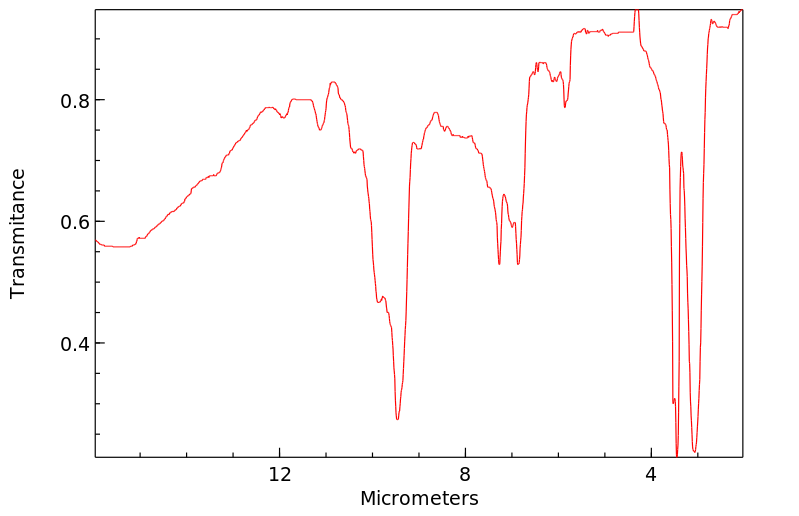3-methylhexane-1,6-diol | 4089-71-8
中文名称
——
中文别名
——
英文名称
3-methylhexane-1,6-diol
英文别名
1,6-Hexanediol, 3-methyl-
CAS
4089-71-8
化学式
C7H16O2
mdl
——
分子量
132.203
InChiKey
SQAJRDHPLTWZQT-UHFFFAOYSA-N
BEILSTEIN
——
EINECS
——
-
物化性质
-
计算性质
-
ADMET
-
安全信息
-
SDS
-
制备方法与用途
-
上下游信息
-
文献信息
-
表征谱图
-
同类化合物
-
相关功能分类
-
相关结构分类
物化性质
-
熔点:44.24°C (estimate)
-
沸点:233.16°C (rough estimate)
-
密度:0.9744 (rough estimate)
计算性质
-
辛醇/水分配系数(LogP):0.7
-
重原子数:9
-
可旋转键数:5
-
环数:0.0
-
sp3杂化的碳原子比例:1.0
-
拓扑面积:40.5
-
氢给体数:2
-
氢受体数:2
上下游信息
-
上游原料
中文名称 英文名称 CAS号 化学式 分子量 3-甲基己二酸 3-methyladipic acid 3058-01-3 C7H12O4 160.17
反应信息
-
作为反应物:描述:参考文献:名称:Qudrat-i-Khuda; Ghosh, Journal of the Indian Chemical Society, 1940, vol. 17, p. 19,24摘要:DOI:
-
作为产物:参考文献:名称:使用均相锰催化剂从二醇和仲醇或酮直接合成环烷烃摘要:使用二醇和仲醇或酮通过级联借氢序列开发了一种合成取代环烷烃的方法。使用非贵重且空气稳定的锰催化剂 (2 mol%) 进行此转化。研究了各种取代的 1,5-戊二醇(3-4 当量)和取代的仲醇(1 当量),以非对映选择性方式制备一系列取代的环己烷。类似地,环戊烷、环己烷和环庚烷环由取代的 1,4-丁二醇、1,5-戊二醇和 1,6-己二醇以及位阻酮在 a (4 + 1)、(5 + 1)、和 (6 + 1) 策略,分别。DOI:10.1021/jacs.9b08832
文献信息
-
A Phosphine-Free Manganese Catalyst Enables Stereoselective Synthesis of (1 + <i>n</i>)-Membered Cycloalkanes from Methyl Ketones and 1,<i>n</i>-Diols作者:Akash Jana、Kuhali Das、Abhishek Kundu、Pradip Ramdas Thorve、Debashis Adhikari、Biplab MajiDOI:10.1021/acscatal.9b05567日期:2020.2.21Herein, we report the stereoselective synthesis of (1 + n)-membered cycloalkane from methyl ketone and 1,n-diol. A manganese(I) complex bearing a phosphine-free ligand catalyzed the reaction, which involved the formation of two C–C bonds via a sequence of intermolecular- and intramolecular-borrowing hydrogenation reactions. It produces 2 mol of water as the sole byproduct, making the process atom economical
-
Stereoselective synthesis of alicyclic ketones: A hydrogen borrowing approach作者:Roly J. Armstrong、Wasim M. Akhtar、James R. Frost、Kirsten E. Christensen、Neil G. Stevenson、Timothy J. DonohoeDOI:10.1016/j.tet.2019.130680日期:2019.11A highly diastereoselective annulation strategy for the synthesis of alicyclic ketones from diols and pentamethylacetophenone is described. This process is mediated by a commercially available iridium(III) catalyst, and provides efficient access to a wide range of cyclopentane and cyclohexane products with high levels of stereoselectivity. The origins of diastereoselectivity in the annulation reaction
-
A phosphine-free iron complex-catalyzed synthesis of cycloalkanes <i>via</i> the borrowing hydrogen strategy作者:Léo Bettoni、Sylvain Gaillard、Jean-Luc RenaudDOI:10.1039/d0cc05840h日期:——Herein we report a diaminocyclopentadienone iron tricarbonyl complex catalyzed synthesis of substituted cyclopentane, cyclohexane and cycloheptane compounds using the borrowing hydrogen strategy in the presence of various substituted primary and secondary 1,n diols as alkylating reagents. Deuterium labeling experiments confirm that the diols were the hydride source in this cascade process.
-
Process for producing oxide with higher oxidation than alcohol申请人:——公开号:US20030114712A1公开(公告)日:2003-06-19The present invention provides a process for producing an oxide from an alcohol compound, the process comprising the steps of causing silica gel to carry the alcohol compound thereon and an oxidative catalyst thereon, and oxidizing the alcohol compound in the presence of an oxidizing agent, giving an oxide higher in oxidizing degree than the alcohol compound, and also provides a process for producing an oxide from an alcohol compound, the process comprising the steps of causing silica gel to carry the alcohol compound, and subjecting the alcohol compound to an electrolytic oxidation, giving an oxide higher in oxidizing degree than the alcohol compound.
-
Lactones 34 [1]. Application of alcohol dehydrogenase from horse liver (HLADH) in enantioselective synthesis of δ- and ɛ-lactones作者:Filip Boratyński、Grzegorz Kiełbowicz、Czesław WawrzeńczykDOI:10.1016/j.molcatb.2010.01.025日期:2010.8The ability of horse liver alcohol dehydrogenase (HLADH) to the enantioselective oxidation of primary–primary, primary–secondary and primary-tertiary aliphatic 1,5- and 1,6-diols 1a–i was studied. No enantioselectivity of the transformations of primary–primary 1,6-diols 1a–d to ɛ-lactones 4a–d was observed. Regioselective oxidation of primary–secondary 1,6-diols 1e,f and 1,5-diols 1h,i afforded enantiomerically
表征谱图
-
氢谱1HNMR
-
质谱MS
-
碳谱13CNMR
-
红外IR
-
拉曼Raman
-
峰位数据
-
峰位匹配
-
表征信息
同类化合物
(±)17,18-二HETE
(±)-辛酰肉碱氯化物
(Z)-5-辛烯甲酯
(Z)-4-辛烯酸
(R)-甲羟戊酸锂盐
(R)-普鲁前列素,游离酸
(R,R)-半乳糖苷
(E)-4-庚烯酸
(E)-4-壬烯酸
(E)-4-十一烯酸
(9Z,12E)-十八烷二烯酸甲酯
(6E)-8-甲基--6-壬烯酸甲基酯-d3
(3R,6S)-rel-8-[2-(3-呋喃基)-1,3-二氧戊环-2-基]-3-羟基-2,6-二甲基-4-辛酮
龙胆二糖
黑曲霉二糖
黄质霉素
麦芽酮糖一水合物
麦芽糖醇
麦芽糖酸
麦芽糖基蔗糖
麦芽糖一水合物
麦芽糖
鳄梨油酸乙酯
鲸蜡醇蓖麻油酸酯
鲸蜡醇油酸酯
鲸蜡硬脂醇硬脂酸酯
鲸蜡烯酸脂
鲸蜡基花生醇
鲫鱼酸
鲁比前列素
鲁比前列素
高级烷基C16-18-醇
高甲羟戊酸
高效氯氰菊酯
高-gamma-亚油酸
马来酸烯丙酯
马来酸氢异丙酯
马来酸氢异丁酯
马来酸氢丙酯
马来酸氢1-[2-(2-羟基乙氧基)乙基]酯
马来酸单乙酯
马来酸单丁酯
马来酸二辛酯
马来酸二癸酯
马来酸二甲酯
马来酸二烯丙酯
马来酸二正丙酯
马来酸二戊基酯
马来酸二异壬酯
马来酸二异丙酯







